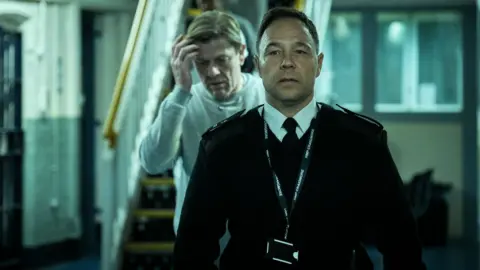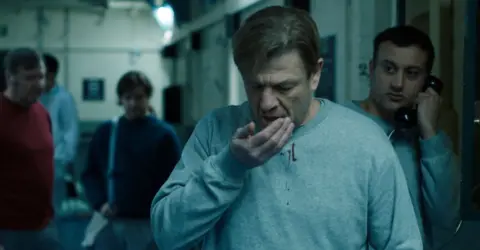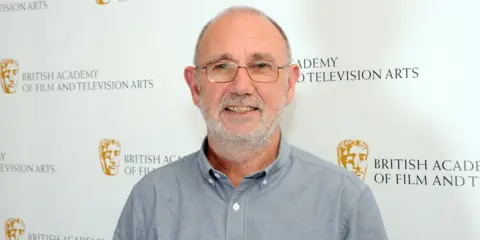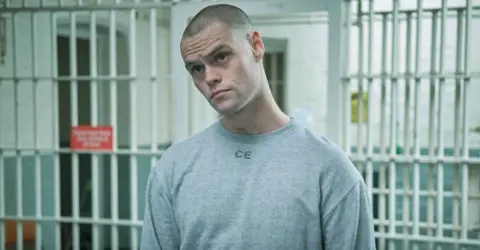Why Jimmy McGovern's prison drama Time is 'difficult to watch'
 BBC
BBCSean Bean and Stephen Graham star in BBC One's new prison drama Time, which begins on Sunday. The three-part series has been written by Jimmy McGovern, who says he hopes it shines a light on the reality of the British penal system.
McGovern, a renowned screenwriter who was also behind Hillsborough, Broken and Accused, says he initially had the idea of setting a drama in a cell block nearly four decades ago.
"From about 1982 onwards, I did a fair bit of work in prisons," he recalls. "I was always popping in there, doing the writer's workshop, popping out again. And I was always fascinated by it for all kinds of reasons.
"But I think the main reason is I always felt 'there but for the grace of God go I'. Because I was young and skint once, and I did a few naughty things, but I was extremely lucky." (McGovern has admitted committing non-violent crimes in his youth.) "And I'm always looking for stories, and the thing about a British prison is it's full of stories."
Liverpool-born McGovern's latest drama Time follows Mark Cobden (played by Bean), a former teacher who has been sentenced to four years inside for drink-driving, after a road accident he was involved in left a cyclist dead.

To start with, the impression the viewer gets is that Cobden doesn't belong here. He's a gentle, well-educated man, who has found himself locked up with some seriously vile and violent young men, who think nothing of literally torturing one another.
"Some scenes should almost certainly carry a content warning, if they should even be shown at all," said Digital Spy in its otherwise favourable review. "It's bleak stuff," agreed The Evening Standard. "There's a sense of grim, almost tragic inevitability to many of the stories that unfurl over the course of three episodes."
Ultimately, Cobden has to adapt and toughen up if he wants to survive. One of several points McGovern seems to be making is that the system is stacked against even the most well-intentioned and well-behaved prisoners.
But there are other themes at play too. The inmates are under-stimulated. There is drug-taking, blackmail, abuse and self-harm. Fights break out over food and phone calls. One character makes the point that their prison has nearly as many staff members as inmates. Another suggests that half of the convicts belong in a mental health facility rather than a prison.
McGovern supports the penal system overall - it's where many criminals belong, he comments, particularly those who are violent. Indeed, viewers will feel a sense of relief that prisons exist when they see some of the characters' behaviour. But he clearly wants to highlight particular elements which, in his view, could be improved.
 Getty Images
Getty Images"[The series] says something that should be said about the penal system, and it's not good," McGovern says. "The British penal system is not good I'm afraid, it needs looking at."
He gets more specific in another interview with BBC Radio 4's Today. "There should be more meaningful activity in British prisons. There should be education and training and jobs," he says.
"At the moment, the vast majority of prisoners are locked up 23 hours a day because of Covid, but even when Covid isn't there, they're still locked up in cells for long periods of time, and they should not be. We should aim to send them out better than when they went in."
In response, a Prison Service spokesman tells BBC News: "We know education is key to reducing reoffending and cutting crime, which is why we are creating a new Prisoner Education Service and work with around 400 employers to provide work and learning opportunities to offenders.
"We have kept education running throughout the pandemic where possible, and prisons are now easing restrictions in line with public health advice."
Bean and Graham previously worked together in the second series of Accused, which was also written by McGovern.
Here, Graham plays prison officer Eric McNally - another of the show's tough characters, albeit with a seemingly good heart. He ends up in a conflicted and unenviable position when inmates get wind that his own son has wound up in another prison, and use that information to threaten him.
Time is hardly the first gritty drama that Graham has found himself appearing in: This Is England, White House Farm and The Irishman are among his other film and TV credits. But the dark and often violent themes running through many of his performances are precisely what attracts Graham to them in the first place.
The actor says: "I love the fact that stuff I do is difficult to watch for people." He pauses for a moment. "What was that one on Netflix, set in the big house or whatever, that was dead successful over lockdown?"
His wife, fellow actor Hannah Walters, ventures an answer: "Bridgerton?"
"Yeah, that was not difficult to watch," continues Graham. "So why is this difficult to watch? Because it's coming into your living room and, as Jimmy said, we've got to look at the penal system, we need to look at certain things and elements within this piece.
"It's not overly political or ramming the message down your throat. But if it's difficult to watch, that's because you're looking at a society which is represented by yourself. So surely it's putting a mirror up to society, and going, 'Not sure if we're getting this right here.' So maybe that's why it's difficult to watch, because it makes you think. And that's all I ever wanted to be a part of. Something that's saying something socially. I want everything I do to be difficult to watch."

Like much of McGovern's work, Time is set in the north of England. The writer clearly enjoys telling stories from less well-represented parts of the country, but doing so throws up some unexpected challenges.
The crime and violence that runs through much of McGovern's work presents something of a Catch 22 - in so far as he wants to bring attention and work to northern cities, but without always depicting them negatively. Interestingly, Graham actually lost out on a role in the second series of Accused for this reason.
"There was a taxi driver [character] who takes a girl to the airport and goes back and burgles her house," McGovern recalls. "It was absolutely perfect for Stephen Graham, and I said, 'We can't have Stephen. We cannot have a Scouser playing the burglar, because of the negative stereotype attached to the city.'"
The taxi driver role eventually went to Andy Serkis, and Graham was instead cast as a different character in a different episode of the anthology series.
"And yet, at the same time, you want the work in the city," McGovern says, highlighting the benefits a TV production can bring to the local economy. "These are highly-paid and skilled jobs. So the only way around that, I think, is to shoot in the city but not necessarily set it in the city. But that leaves you wide open to charges of not giving Scouse actors jobs in Scouse dramas."

Time begins on BBC One at 21:00 BST on Sunday, with all three episodes then being made available on iPlayer.
